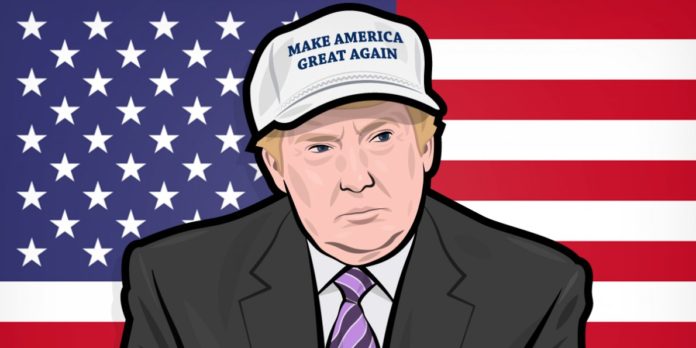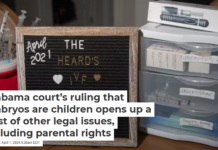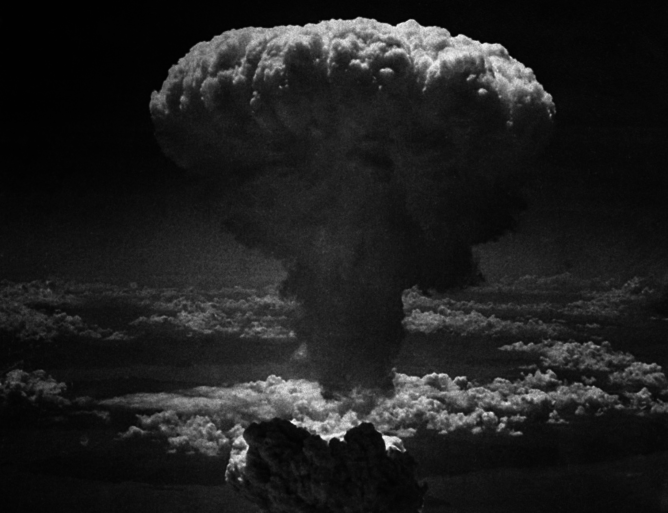
How Rob Hill, a Lifelong Democrat whose father stood next to Robert F. Kennedy the day he was assassinated, knew that Donald Trump would win the Republican Primary, and why he might be bracing (and perhaps subconsciously hoping) for a Trump Presidency to bring the United States’ deeply frozen political establishment to a boil.
As a kid I used to watch TV in my Dad’s study as he was doing paper work, paying bills, and other adult-type stuff. There was a black and white photo in a frame next to the TV of my father with, although I didn’t know it then, Robert F. Kennedy. Two young, clean-cut Catholics full of optimism and hope. What I didn’t know, until recently, was that that photo was taken the night RFK was killed at Los Angeles’s Ambassador Hotel, in 1968. The Kennedy’s were Dad’s heroes and it was on his drive home that hot summer night that he heard that RFK had been shot and killed. He, like most of America, was devastated.
My father was a stock broker at Cantor Fitzgerald (he wasn’t in the building when it came down on September 11th, but dozens and dozens of comrades and friends were) and, later, no doubt inspired by the Kennedy’s, the mayor of Calabasas. He was practically the only Democrat in the trading room and was kidded and ribbed all the time. He was not a big fan of Jimmy Carter, and, I believe, he voted for Reagan twice—a California Reagan Democrat as they were called. Then Bill Clinton lured him—and me (the first president I voted for)—back to the Democratic party. And, then, George Bush virtually guaranteed we both wouldn’t be leaving anytime soon.
ICE AGE
Fast-forward to June of 2015 when Donald J. Trump came down the elevator at Trump Tower to announce his bid to run for President. My Dad and I watched it together at his house—the RFK picture still hanging in the study—and both sort of chuckled as he talked of building a wall, crushing ISIS, re-negotiating our trade deals, bringing trillions of off-shore money back to the US, fixing the Veterans hospital catastrophe, lowering taxes, flirting with tariffs on China if they keep manipulating their currency, and stopping our corporations from leaving America for cheaper labor—better profits—in distant lands.
When Trump had finished his announcement, however, something in me wasn’t really chuckling.
Why?
The last 15-to-20 years of politics, which I followed mostly on MSNBC, had become a slaughterhouse of failures, bad choices, deep divisions, scandals, endless wars, mounting debt, no will for a tax overhaul, Government shutdowns, screaming matches on the Senate floor, name-calling, Religious baiting, intrenchment, intransigence, gerrymandering, and, especially over the last eight years, a stalemate that has frozen our government in a thick ice cocoon while the world zooms outside its calcified orbit with unprecedented real-time change. Everyday change. Industry change. Looking to the future change. Stuff that seems to happen in every sector of life—but our government. America is caught in the mud. As much as I like and admire President Obama, he was not able to fulfill his hope and change message; his negotiating skills were not his strong suit, and it was clear, virtually from day one, there wasn’t going to be any cigar smoke-filled backroom deals or strong-arming that LBJ, FDR or Lincoln used so effectively to get deals done in the face of a do-nothing congress’s. It’s not Obama’s style. Deals would get into the Red Zone, but would inevitably wither; nothing was getting done. Nothing. In fact, last summer, Chris Matthews ended one of his shows by claiming we “do not have a government right now.”
Something had to give.
DON THE DISRUPTOR
I’d never really paid too much attention to Donald Trump—even though I lived in NYC from 1999-2007 while he was the clown prince villain to Gotham’s fomenting tabloid press—as I had not read any of his books, didn’t watch The Apprentice, and had never been in any of his hotels or golf resorts. However, two weeks after he announced, I decided to read The Art of the Deal, his best-selling business tome, to see what he was all about. When I was done, I knew he was going to win the Republican nomination. He would be The Outsider at the gates with his masses who were frothing that they were “America’s forgotten”: Our parents and grandparents defeated Hitler and Japan; our wages have not gone up in 25 years; our grandchildren can’t get good jobs; and many of our own grown kids (60 million according to the NY Times) are now living at home again, unable to make it on their own.
It’s become clear in the last few years, America was ripe for a disruptor, someone to come along and say that they alone could get the engines of deal making humming again (the exit polls said as much) in D.C., break the stalemate, and get America poised for a 21-century cloudburst of prosperity that would make the Industrial Revolution seem tame.
This was August 15th of 2015.
I told everyone I knew that he was going to win: emails, IMs, dinner conversations, etc. Of course, they all laughed. Everyone. Trump is a clown. He inherited 200 million from his father. He’d sell his grandma to make a deal.
But lurking below the headlines and media electrical storm, somewhere out there beyond the everglades, something was stirring—and I knew it. I even placed a wager with a buddy of mine that Trump would win the primary. (“I feel bad taking your money, Rob”). I collected $2,500 a few weeks ago when he was coronated at the convention. (I still haven’t cashed the check but nonetheless have proof that my outlandish prediction, that no one believed—to this day!—was spot-on.)
Why did I know he was going to win?
As I decided to take a detached, 30,000 foot look at what was happening in the country, the world, this election, there were multiple variables that all conveniently added up to him winning the primary.
One example that I remember vividly hitting was when, after Trump won Nevada, David Axelrod, a man I have so much respect for and would use as a smart barometer of what is going on out there politics-wise, soberly looked into the MSNBC cameras and in palpable reluctance and strain exposed his personal theory: “When there is a change election, like this one, more often than not the exact opposite of the current president wins. It’s human instinct to do this”, he claimed. Was Axelrod glumly predicting a possible Trump victory? Or was he firing a shot over the bow of the limousine liberals on-set who were still saying Trump was a joke, will flame out, has no ground game, won’t spend the money, is losing delegates by the hundreds, etc, etc.?
Another was when I was reading The Washington Post about the wealthiest zip codes in America. It read:
“In the Washington, D.C. area, for example, 20510, which includes the Senate office buildings, ranks as the wealthiest zip code in the District, with an average income of $191,818. In Maryland, the wealthiest zip code is 21056, Gibson Island, with an average income of $450,012. In Virginia it’s Roanoke (24005), with an average income of $394,400.”
The vicious recession of 2008 had left many American in finical ruins, but our leaders in Washington D.C. didn’t seem to feel a thing. The gravy train didn’t miss a beat.
However, I did have my doubts. It was just so improbable that Trump could win. He hit a myriad of the land mines that should/would/will have sunk any political vessel: the David Duke comments, not raising his hand at the first debate when asked if he would guarantee he would not run as an independent, the nicknames (“Lyin’ Ted,” “Low-Energy Jeb,” “Little Marco”), the QVC fiasco after he won Florida, the Megyn Kelly feud, questioning John McCains war hero status, etc.
To be sure, Trump miraculously survived one blow after another, as well as a media that was so viciously—never-in-our-lifetime-we-will-kill-you-before-we-let-America-elect-you— bias that it was almost breathtaking to witness. Grown men and women—our self-appointed know-it-alls like Joe Scarborough, Karl Rove, Cokie Roberts, George Stephanopoulos, Jake Tapper, etc. (is he afraid of his own shadow?)—were throwing daily hissy fits on set as they wrapped themselves up in a Prep School pretzel of denial, history, and intellectualism while coming to grips with what was happening.
Every industry in the last few decades has seen it disrupted, fractured, up-ended, and in some cases, wiped-out, by strong forces of innovation, pragmatism, and stardust dreams: Sean Parker’s Napster brought the music industry to its knees; Uber has made buying an expensive taxi cab medallion/license practically worthless; AirBnb, in just 8 years, has built up over 1,500,000 listings in 34,000 cities and 191 countries, taking billions out of the hotel industry; Tesla did the impossible by making a luxury, high-end battery powered car that Ford, Chrysler and the rest couldn’t seem to do; Amazon has become a bigger retailer than WalMart; Reality TV toppled the sitcom; and, of course, the Internet, social media, smart phones, tablets, etc. have effectively chopped down the newspaper business.
But what about politics and government?
Well, it’s been old-school business as usual, of course. More dollops of, yawn, Paul Ryan, McConnell, Pelosi, Reid, etc., etc.
Until Don.
Whether you like him or not, he is the Napster or Uber of D.C.—reviled, feared, despised, to-stop-at-all-costs!
Litigated to death.
And, well, they (the politicians) deserve the fact that an ogre has stomped into their well-manicured garden. I bet if they could put a wall up to keep HIM out they would.
They brought this on themselves, just as the other industries I touched upon above did by not reinventing themselves, not paying attention to the shifts in culture, what their customers wanted.
They, Congress, with their now 8-11 percent approval rating (they unashamedly smirk in their badly-fitting $1,200 suits on TV that only “friends and family now approve of them”), three-day work weeks, paid vacations, and the best medical care, just want to keep the gravy train rolling with no end in sight. I mean, they don’t even have to do their jobs (six-figure salaries) to keep their jobs.
Jeez.
I mean, how long were the American people going to put up with this?
The answer:
No more.
LOW CULTURE DYNASTY
Of course, all the above was also on a collision course with our molting pop culture digital establishment. For almost two decades now, reality TV has dominated the ratings and been a cash cow for the ailing networks in the digital age. Desperate times called for desperate—and cheap!—measures: Amazing Race, Survivor, Top Model, American Idol, Dancing with the Stars, The Bachelor, Duck Dynasty, Fear Factor, and, of course, The Apprentice, were being watched by tens of millions of people every week as they cheered, prayed, and rooted for their faves. The genre was wide and deep and could tackle any profession, however arcane—from crab hunting in the tundra to voting on who I should marry.
But politics had escaped its fast-food metamorphosis.
Until now.
Trump’s campaign manager, Paul Manafort, told MSNBC a few months ago that this race for the presidency is the “ultimate Reality TV show.” He’s right. Often called “low culture,” these shows preyed upon viewers basic, simple human needs and instincts (to win!) week in and week out. In short, the escapism of living through someone else’s life, all the while getting heapings of crude, outlandish, despotic, and unsavory characters that you actually rooted for in some strange way. I mean, these guys can say and do things that would get me fired! Amazing.
Sound familiar?
And one of the archetypes that often became viewer’s favorites was ‘the underdog’. If there ever was an underdog—he was 75 to one to win the Republican nomination in August of 2015—it was Donald Trump as he came down that escalator. Millions took notice and almost immediately began rooting for him while the mainstream media mocked, dismissed, and, most importantly, underestimated him.
Of course, America is the quintessential historic underdog: she brazenly fought the American Revolutionary war against the British Empire, who had never lost a battle, and surely didn’t think that a raggedy bunch of farmers with bad muscats, no shoes, no government, and poor rations was any match for them.
They laughed at us.
Mocked us.
Didn’t take us seriously.
And we won.
It’s been in our psyche since the very beginning—and I have a hunch Trump instinctively played with this, mostly unconsciously, I bet, as he breathtakingly barnstormed across America taking one primary after another in states that he had no business in winning. And by a lot!
However, it’s been an often times toxic and cringe-worthy serpentine ride full of ups and downs, strikes and gutters, gaffes and victory laps.
For instance, when he came in second in Iowa—second!—I doubled down; when he lost Wisconsin it looked like maybe the Trump Train would be halted and I’d be laughed at again. (At this point, most of my friends, many of them liberals, caught up in Bernie’s astounding moonshot, were still in deep denial—and anger?—about Trump. They just could not—would not—accept the notion that this bigoted buffoon billionaire bully could win.)
After every win my phone would be silent, texts not returned, emails unacknowledged. After a few days, it was back to…”Yeah, but he can’t win California…and even if he did get close to winning it all, a contested convention would surely happen and halt the train.”
It’s been an interesting exercise to take myself out of the putrid fray that this election season has become, and objectively watch the conflagration from a self-imposed distance.
The most well-educated of my friends were the most overt about dismissing and cartooning Trump from the start—and along the way to victory. I’d play dumb now and again, and ask:
“How could a guy with such impressive kids, all of them, be such a hellishly racist T-Rex?”
Liberal Friend: “Those kids have been spoiled their whole lives! Pampered rich kids! But…Ivanka is kind of hot.”
“Jeez, how could a guy who had a documented income of $557 million in 2014 be such a horrible, inane, insane, stupid business man?”
Liberal friend: “He’s filed for bankruptcy a few times and he makes most of his money from licensing.”
Trump has been on the ropes more times than Rocky Balboa, maybe. But no one could knock him out.
UNDERDOG DAYS OF SUMMER
Researchers have found that those who are viewed as disadvantaged, or overmatched, bring out people’s sense of fairness and justice—i.e. underdogs. The researchers also found that people tend to believe that underdogs put forth more effort than the establishment. Rocky Balboa, of course, comes to mind. The USA hockey team of 1980, too.
You might ask, how could a billionaire be an underdog? Well, as everyone from the media to the Republican establishment to the Left all descended on Trump like bewildered and indignant jackals, making fun of him, chuckling at his ideas, laughing at his policies, calling him “dangerous,” “a threat to the Republic,” and “unfit to be president”…he only got stronger, filling bigger arenas, doing more TV, growing his Twitter feed, being talked about by the Pope, the President of Mexico, Putin, Obama, Bill Clinton, Zuckerberg, the Bushes, Bloomberg, Buffett, The Kochs, Fortune 500 CEOS, the Mayor of London, the Prime Minister of Canada, Robert De Niro, Letterman, Dan Rather, and even poor old Mitt Romney, who made a fool of himself by awkwardly and stiffly trying to assert himself as the moral authority of America. Twelve million votes later, Trump won in a historic landslide over 17 other candidates (“the deepest Republican primary field ever seen”), including toppling one of America’s last two political dynasties. The Establishment hysteria, and everything else, backfired.
OVAL OFFICE SUPERHERO?
These days, practically the only thing that is saving the old Hollywood theatre revenue model from extinction are superhero movies. They get recycled, updated, revised, combined, and made bigger and bawdier than ever a few times a year. I have a hunch, as I look at the crowds gathered at Trump rallies, that there is a sense, possibly subconsciously, possibly more consciously, that he is their superhero (his superhuman power is his ability to get stronger the more he is attacked?), a figure that is dedicated to fight for them: fight for their jobs, their values, their loss of faith, protect their rights and, of course, entertain them. It would be amiss not to mention Trump’s close (and ironic) association with the ultra violent current studio superhero flick, Suicide Squad—his chief fundraiser, Steve Mnuchin, being the blockbuster’s executive producer. (Didn’t Trump get caught in the Spring as tapes surfaced of him using his secret identity “John Miller the PR lackey” talking to People magazine about “Trump’s” success with women and business? Trump denied that the voice was his.)
ZANINESS & THE ART OF THE RALLY
Trump seems most comfortable and born-to-do-this at his rallies, often times filling arenas meant for NBA Finals games, college football championship stadiums, and airplane hangars. I’ve been to rallies in past elections, and, boy, are they a snooze. Trump, in true superhero fashion, seems to gain energy from them, often times doing three or four in one afternoon in multiple states. He’d fly his plane overhead—it’s a bird, it’s a plane, no it’s…—land, and make his way to the stage to rock ’n’ roll music, The Stones, Queen, The Beatles. He’d turned these bore-fests into a sort of Don-Rickles-roast-meets-WWE, an hour of rambling anecdotes, off-color jokes, sarcasm, taunting, and bellowing, all the while hopscotching from one subject to another, punctuated by zingers. In all the rallies I have been to prior, laughter was not one of the things I had seen. One thing Trump is a master of is making you believe he is the “victim,” “being pitted against,” and constantly reminding his audiences that “the system is rigged” against him—and them! all the while selling thousands of hats, T-shirts, bumper stickers, and beach towels to the adoring masses. In many ways, he is a master magician, able to seemingly squirm his way out of any controversy, fox hole, and gaffe.
Case in point: his tax returns. Trump has masterfully created the one thing, unlike poor Mitt Romney, that, on the surface, would not allow him to show them: an audit. In fact, every tax lawyer I have seen talk about this on TV (well, except MSNBC) agrees: if he is being audited then I would never advise him to release his taxes until it is done.
So where does this all leave us?
While I am not surprised at all that Trump won the primary, winning the presidency is an entirely different animal. Or is it, today? Can Trump ride the tidal wave of his rallies, his larger-than-life persona, his underdog appeal, his sea of Twitter followers, his “what did Trump say today” sugary soap opera drama all the way to the White House, becoming, in essence, the disruptor-in-chief, and the biggest political story of our lifetime?
If enough people (he’d need to find roughly 6-7 million voters who DON’T VOTE) decide—maybe literally in the booth—that they can’t live without Donald J. Trump and his zingers and tales and feuds and nicknames in their lives for the next four years, they won’t have to live without him. Their superhero, Donald Trump, could be the President of the United States. And if not, would the city be in disorder without him? Then again, I have a hunch even if he loses his fans will still get their fill of Trump in one way or another.
Memo to NBC: AMERICA’S TOP MAYOR
Feature image source: buinessinsider.com





















Nice post. I study one thing more difficult on completely different blogs everyday. It will always be stimulating to read content material from different writers and practice slightly something from their store. I抎 want to make use of some with the content material on my blog whether or not you don抰 mind. Natually I抣l offer you a hyperlink on your net blog. Thanks for sharing.